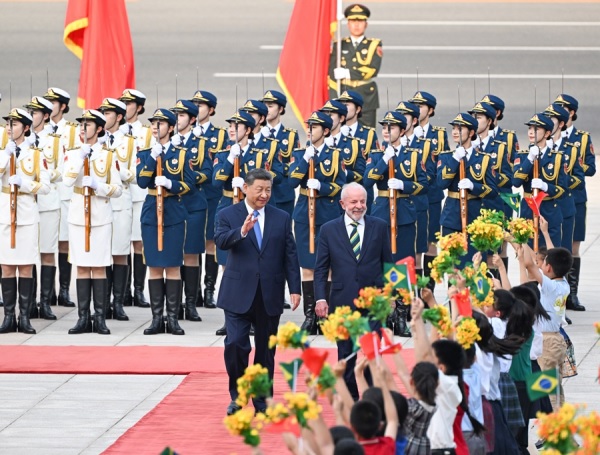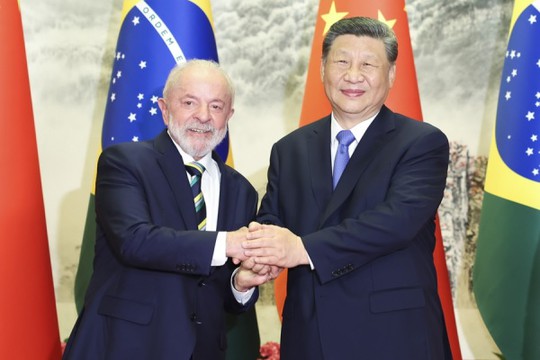President Xi Jinping with Brazilian President Luiz Inácio Lula da Silva.
Photo: Xinhua
On the afternoon of May 13, 2025, President Xi Jinping held talks with Brazilian President Luiz Inácio Lula da Silva, who is on a state visit to China, at the Great Hall of the People in Beijing.
Xi Jinping noted that on the occasion of the 50th anniversary of the establishment of diplomatic relations between China and Brazil last year, the two sides jointly announced the elevation of bilateral relationship to a China-Brazil community with a shared future for a more just world and a more sustainable planet. This strategic decision has drawn a grand blueprint for the next "golden 50 years" of China-Brazil relations.
Amid the changing and turbulent international landscape, China and Brazil should remain committed to the original aspiration of contributing to human progress and global development, deepen the building of a China-Brazil community with a shared future, continuously seek greater synergy between development strategies, and work together to promote greater solidarity and coordination among Global South countries.
Xi Jinping stressed that standing at a new historical starting point, China and Brazil should first uphold strategic mutual trust to consolidate the foundation of the China-Brazil community with a shared future. The two sides should carry forward the fine tradition of mutual respect and mutual benefit, support each other on issues related to their respective core interests and major concerns, and strengthen exchanges at all levels and in all respects to ensure the long-term, sound and steady development of bilateral relations. Second, the two sides should expand cooperation and enrich the China-Brazil community with a shared future.
President Luiz Inácio Lula da Silva said, Brazil and China uphold mutual respect and share a common future. The bilateral relationship remains solid and unbreakable, and brooks no disruption or undermining by any external factors. Unlike other major countries, China has consistently offered sincere support and assistance to Latin American countries, including Brazil, in their pursuit of economic and social development.
Brazil is willing to deepen strategic cooperation with China, advance the building of a Brazil-China community with a shared future, work together to build a more just, peaceful and prosperous world, and set an example for other countries. Brazil is ready to synergize its development strategies with the Belt and Road Initiative and deepen cooperation with China in such areas as economy and trade, infrastructure, aerospace, and finance.
After the talks, the two heads of state jointly witnessed the signing of 20 cooperation documents covering areas such as the synergy of development strategies, science and technology, agriculture, the digital economy, finance, inspection and quarantine, and media.
The two sides issued the Joint Statement between the People's Republic of China and the Federative Republic of Brazil on Strengthening the Building of a China-Brazil Community with a Shared Future for a More Just World and a More Sustainable Planet and on Jointly Upholding Multilateralism, as well as the China-Brazil Joint Statement on the Ukraine Crisis.
 Photo: Xinhua
Photo: Xinhua
Lula touched down in China’s capital on Sunday for a four-day state visit, accompanied by 11 ministers, top politicians and a delegation of more than 150 business leaders, notes ‘The Guardian’.
Hours later Colombia’s president, Gustavo Petro, arrived, making a beeline for the Great Wall of China and declaring his desire for the South American country to not “only look one way” towards the US. “We have decided to take a profound step forward between China and Latin America,” Petro said.
Chile’s Gabriel Boric has also travelled to Beijing to attend Tuesday’s meeting between members of the Community of Latin American and Caribbean States (Celac) and Chinese representatives.
Addressing hundreds of Chinese and Brazilian business chiefs in the Chinese capital on Monday, Lula hit out at Trump’s tariffs, saying he could not accept the measures “that the president of the US tried to impose on planet Earth, from one day to the next”.
“China has often been treated as though it were an enemy of global trade when actually China is behaving like an example of a country that is trying to do business with countries which, over the past 30 years, were forgotten by many other countries,” said Lula.
The visit of the three South American leaders to China underlines the east Asian country’s rapidly growing footprint in a region where, over the past 25 years, it has become a voracious consumer of commodities such as soybeans, iron ore and copper. Chinese companies have also poured into the region. Electric cars made by the Chinese manufacturer BYD can be seen cruising the streets of Brazilian cities, from Brasília to Boa Vista, deep in the Amazon.
Matias Spektor, an international relations professor at the Getúlio Vargas Foundation, a Brazilian thinktank and university, said the presence of the three South American presidents in Beijing underscored how, in the Trump era, with the US in retreat, such leaders were increasingly reaching out to other parts of the world.
“It tells us that countries around the world are willing to go out… to exploit all the opportunities that are there in the international system – and there are many. Because, as America turns away from free trade and as America adopts a policy that is… instead of transactional, predatory – countries have an incentive to engage with those who are transactional,” Spektor said, pointing to recent trips Lula made to Japan and Vietnam.
Spektor said Latin American leaders such as Lula had long considered the world a multipolar place. “What happened on 20 January [with Trump’s return to power] is that the barrage of policy change coming from Washington DC has accelerated the belief that was already in place that the axis of global power has for a while been moving towards the east, and somewhat towards the south.”
read more in our Telegram-channel https://t.me/The_International_Affairs

 11:01 16.05.2025 •
11:01 16.05.2025 •























